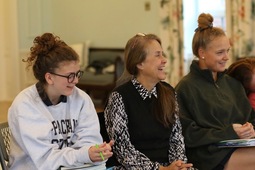
May 13, 2019
By Kim Harris Thacker P’24
Two years ago, Walker’s began to offer the Visiting Writer Seminar, an English elective for juniors and seniors through which students make an in-depth study of the works of a professional writer. Toward the end of the semester-long class, the writer comes to Walker’s to teach craft workshops and masterclasses to the students in the seminar and to address the wider Walker’s community.
“Bringing writers to campus has a profound impact on the culture of our school and on the possibilities that students can imagine for themselves,” says Lindsay Hodgman, who teaches the class. “They have the opportunity to meet a writer they’ve been learning about and ask questions that only the writer can answer.”
“The visit allows students to learn about the struggle to publish, the work involved, the lucky breaks and the joy of reaching a global audience,” explains English Department Chair Catherine Reed.
So far, writers who have traveled to Walker’s as part of the Visiting Writer Seminar are Anne Fadiman (fiction and non-fiction), Aimee Nezhukumatathil (poetry), Natalie Diaz (poetry) and Naomi Shihab Nye (poetry, essays and fiction). The writers who are scheduled to visit during the 2019-2020 academic year are Paisley Rekdal (poetry and non-fiction) and Alison C. Rollins (poetry).
“Naomi Shihab Nye’s recent visit to Walker’s was a luminous experience for our students and community,” says Hodgman. “In her classes and readings, she reminded us that we are all poets. She encouraged each of us to keep a notebook nearby and to observe the world, recording the big and little wonders of our daily lives. Her magnetic presence and profoundly felt kindness lifted everyone into the air, making us believe in ourselves, our voices, and the power of poetry to improve our lives and the world.”
After a writer visits the school, and as the final project in Hodgman’s class, her students apply what they have learned throughout the semester to conceptualize, lay out and author their own creative works. “At Walker’s, we encourage students to build a love of learning and of reading,” she says. “As we challenge them to develop their voices, they need to see and hear from women writers who are using their words to make a difference in the world.”
“The writers we have had so far have all been strong, politically-engaged, articulate women,” says Reed. “Each of them has shown our girls how to use their voices to promote justice in the world. While Fadiman, Nezhukumatathil, Diaz and Nye are all very different people, their ability to tell women’s stories in ways that move is a magic that they share.”